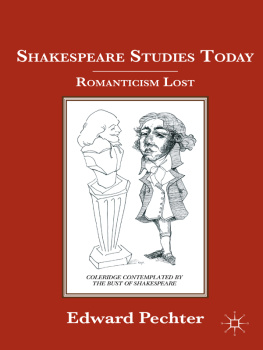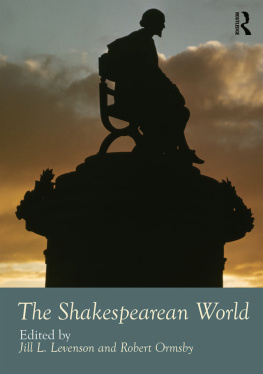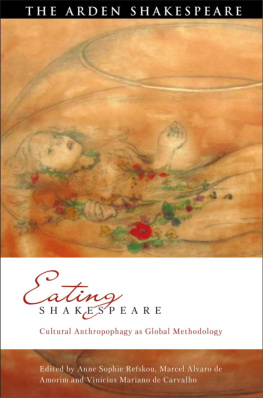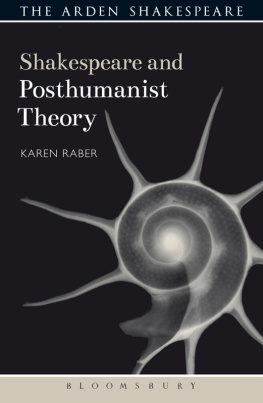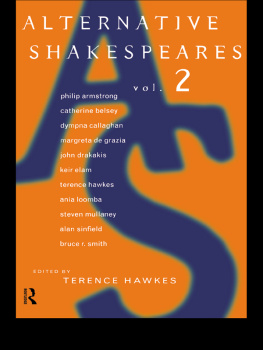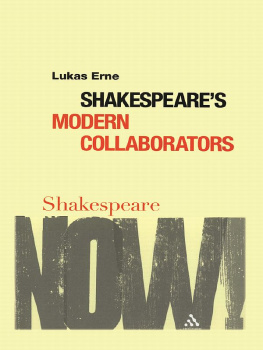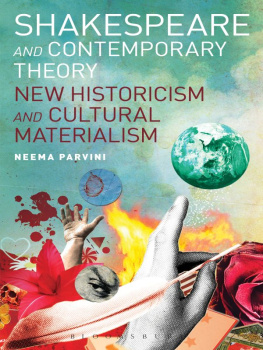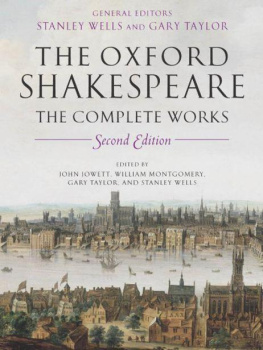Praise for Shakespeare Studies Today: Romanticism Lost
Shakespeare Studies Today is a rigorous critique of the Shakespeare Industrys still-current sociological focus and a call for an aesthetics-based alternative. Considering the quantity of debunking necessarily involved in his project, Pechter is consistently and remarkably gracious. More remarkable still is Pechters reader-friendly, jargon-free prose. I am surprised at how much I enjoyed reading his book.
Stephen Booth, Professor Emeritus,
University of California, Berkeley
Shakespeare criticism isnt much fun anymore. It isnt a lot of fun to read, and it doesnt seem like its all that much fun to write. Shakespeare Studies Today is Pechters explanation for how this has come to pass. Pechter is not afraid to mix it up with people he disagrees with, but he is also a writer with admirable forbearance, a great sense of humour and a deep enthusiasm for Shakespeare. He wants to put Shakespeare back into the center of Shakespeare criticism and to restore a sense of appreciation for Shakespeares greatness as a writer.
Michael Bristol, Greenshields Professor Emeritus,
McGill University
Pechters bold critique of current Shakespeare studies argues for a reappraisal of nineteenth-century readings of the plays. Pechter pulls no punches about current interpretive practice, and his controversial arguments uncover dazzling insights that no one interested in Shakespeare can afford to ignore.
Dympna C. Callaghan, William Safire Professor of
Modern Letters, Syracuse University
Also by Edward Pechter
Drydens Classical Theory of Literature.
What Was Shakespeare? Renaissance Plays and Changing Critical Practice.
Editor, Textual and Theatrical Shakespeare: Questions of Evidence.
Othello and Interpretive Traditions.
Editor, Othello: A Norton Critical Edition.
Shakespeare Studies Today
Romanticism Lost
Edward Pechter


SHAKESPEARE STUDIES TODAY
Copyright Edward Pechter, 2011.
All rights reserved.
First published in 2011 by
PALGRAVE MACMILLAN
in the United Statesa division of St. Martins Press LLC,
175 Fifth Avenue, New York, NY 10010.
Where this book is distributed in the UK, Europe and the rest of the world, this is by Palgrave Macmillan, a division of Macmillan Publishers Limited, registered in England, company number 785998, of Houndmills, Basingstoke, Hampshire RG21 6XS.
Palgrave Macmillan is the global academic imprint of the above companies and has companies and representatives throughout the world.
Palgrave and Macmillan are registered trademarks in the United States, the United Kingdom, Europe and other countries.
ISBN: 9780230114197
Library of Congress Cataloging-in-Publication Data
Pechter, Edward, 1941
Shakespeare studies today : romanticism lost / Edward Pechter.
p. cm.
Includes bibliographical references.
ISBN 9780230114197
1. Shakespeare, William, 15641616Criticism and interpretationHistory20th century. 2. Shakespeare, William, 15641616Criticism and interpretationHistory19th century. I. Title.
PR2970.P42 2011
822.33dc22
2010043217
A catalogue record of the book is available from the British Library.
Design by Newgen Imaging Systems (P) Ltd., Chennai, India.
First edition: June 2011
10 9 8 7 6 5 4 3 2 1
Printed in the United States of America.
For E. A. J. Honigmann;
and for Ben and Beth and Dave and Ceilidh
PREFACE
This book is about how Shakespeareans go about their business at the present time. It argues that we can perform more effectively and with more conviction by relaxing some of the materialist principles guiding current work, and by reconnecting with the traditions of Romantic commentary, beginning with Hazlitt and Coleridge and continuing up to A. C. Bradley, from which our own critical practice has developed.
Since the Introduction spells out this argument in detail, I limit myself here to thanking at least some of the many people and institutions who have facilitated my work. A grant from the Social Science and Humanities Research Council of Canada helped with much of the research and writing. During the spring and fall of 2008, I was given the opportunity to try out some of my ideas in a number of academic settings, where the response made me realize that I was writing a very different book from the one I thought I was writing. For setting up these presentations and for filling up the seats with people poised to ask smart and usefully embarrassing questions, I am grateful to Tom Cain, Patrick J. Finn, Marcie Frank, Elizabeth Hanson, Lynne Magnusson, Kathleen McLuskie, Gordon McMullan, and Paul Yachnin.
Parts of this book are based on prior publication. For editorial generosity and advice, my thanks go to Graham Bradshaw (Shakespearean International Yearbook 3, Ashgate); Christy Desmet and Robert Sawyer (Harold Blooms Shakespeare, Palgrave); Peter Holland (Shakespeare Survey 59, Cambridge University Press); Alan Sinfield and Peter Nicholls (Textual Practice, 11 and 17, Taylor and Francis); and Paul Yachnin and Patsy Badir (Shakespeare and the Cultures of Performance, Ashgate).
I benefited from the encouragement and advice of friends and colleagues at the University of Victoria, including Gordon Fulton, Gary Kuchar, Richard van Oort, and Terry Sherwood of the English Department, and Sara Beam and Matthew Koch of the History Department. I got more help than I could have expected from Jo Roberts, Brigitte Shull, and Ciara Vincent at Palgrave Macmillan, and from Rohini Krishnan at Newgen. Special thanks to Michael D. Bristol, for characteristically smart and helpful suggestions, to Marjorie Garson, who made every page of this book better, and to Lesley Wynne Pechter, who conceived and executed the cover illustration, and who made writing the book feel worthwhile.
Introduction
This book takes off from three claims: (1) in Shakespeare studies at the present time, the level of conviction required to sustain a healthy critical practice is problematically if not dangerously low; (2) the qualities which the Romantics valued in an engagement with Shakespeare are either ignored these days or fundamentally misunderstood; and (3) there is a causal relation between the first two points. The Romantics invented Shakespeare studies (a bald assertion to which I shall return in a moment), and current Shakespeareans, having grown increasingly remote from their origins, have not been able to develop an adequate alternative foundation on which to build their work.
The first claim is the least controversial. That Shakespeare studies finds itself at an impassestuck in a morass or stranded in the critical doldrumsis regularly asserted in its current work. For the critics using these terms and for many others (they will be identified in are striking examples) would probably agree. For even the most phlegmatic, Shakespeare studies looks substantially less robust than might be expected, let alone wished.
These accounts may exaggerate the problem. According to Marcie Frank, literary criticism finds itself in crisis with a regularity that could almost be called soothing (p. 4). Bad news is good news; it makes for a better story; good news is not newsworthy. (This is a version of Tolstoys all happy families are the same.) There is a wide gap between most peoples daily lives, and the representation of those lives in the accounts of fires, murders, and car accidents that fill up the nightly news. Then too, the particular nature of our enterprise may tend to reinforce exaggeration. Criticism is essentially a problem-solving activity; without a problem to solve, wed be like the disembodied soul in Donnes Air and Angels who else could nothing do. We cringe at the clichd opening claim that people have noticed X, but no one has noticed Y, and there is a need (sometimes a very real need) to notice Y. Kingsley Amis ridicules the maneuver in
Next page
